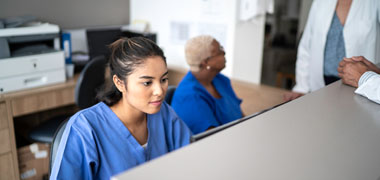
How do I become a Biomedical Researcher in Maitland?
Get qualified to work as a Biomedical Researcher with a course recognised across Australia. Speak to a training provider to learn more.
Course providers in Maitland
The following providers offer Biomedical Researcher courses in Maitland, New South Wales.

Related career opportunities
Browse occupations related to Biomedical Researcher
Further reading


How to start a career as a Medical Receptionist
7th December 2021
What can you do with a Certificate III in Business Administration (Medical)
1st September 2020All biomedical researcher courses
Biomedical Researcher careers
If you are considering a career as a Biomedical Researcher, the Biomedical Researcher courses in Maitland offer you a pathway to success in this dynamic and evolving field. With a total of two courses available, those seeking to advance their careers will find opportunities such as the Bachelor of Biomedicine and the Master of Biostatistics particularly appealing. These courses are tailored for experienced learners, ensuring that you can build upon your previous qualifications and knowledge to excel in biomedical research.
Maitland, located in the beautiful Hunter Region of New South Wales, is home to a vibrant community of healthcare professionals and researchers. As you pursue your education through these high-quality Biomedical Researcher courses in Maitland, you will also be stepping into a region ripe with opportunities for employment in various related job roles. Consider exploring positions such as Laboratory Assistant, Ecologist, or Toxicologist to complement your studies.
The comprehensive training provided through these courses not only focuses on theoretical knowledge but also emphasizes practical skills applicable to the workforce. As a Biomedical Researcher, you will develop essential capabilities that prepare you for roles such as Biomedical Scientist, Research Scientist, and Biotechnologist. With the robust education system in Maitland, you will find support from qualified trainers and industry professionals eager to assist you on your journey.
As you embark on this educational path, it’s also worthwhile to explore various other career options that complement the Biomedical Researcher role. Your training will prepare you for diverse job roles such as Microbiologist, Embryologist, and Molecular Biologist. Each profession opens the door to a range of work environments, from laboratories to hospitals, enhancing your practical experience and understanding of the biomedical field.
Ultimately, pursuing Biomedical Researcher courses in Maitland not only sets you on a career path filled with potential but allows you to play a significant role in advancements in healthcare and science. By choosing to study in this picturesque town, you will be joining a community that values research and innovation. With dedication and the right training, you are well on your way to a successful future in this rewarding field, taking steps towards impactful roles such as Biologist, Forensic Biologist, or even a specialist role like Ecotoxicologist.
